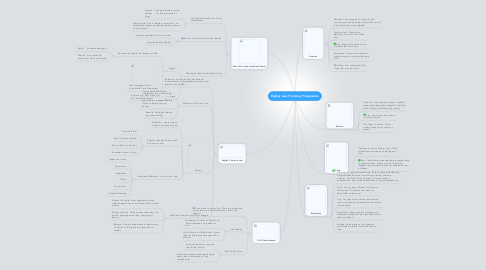
1. Aquinas
1.1. Definition: An ordinance of reason for the common good made by the one who has care of the community and promulgated.
1.2. Forms of Law: Eternal Law; Natural Law; Human Law; Divine Law
1.3. Key: Reason, the ability of man to discern the Eternal law
1.4. Boundaries: Human law should not prohibit every vice or proscribe every virtue
1.5. Validity: Law not aligned with eternal law is no law at all!
2. Bracton
2.1. Definition: Law in special sense: a rightful warrant enjoining what is honest for building what is honest, forbidding the contrary
2.2. Key: Law is more than power; it is tied to justice
2.3. Two Types of Justice: God's perfect justice and a just man's justice
3. Coke
3.1. Definition of Law of Nature: Law of God infused into man's heart by the finger of God
3.2. Key: Law of Nature was applied to a present case to make a verdict; ligence is owed to the king. Maybe a poor decision, but one connected to Law of Nature
4. Blackstone
4.1. Definition of Law: Comprehensive: Rule of action prescribed by a superior that an inferior must obey (including inanimate objects); Confined: Rules of action of human conduct; commands for use of free will and reason in regulating behavior
4.2. Forms of Law: Law of Nature; Divine Law; Natural Law????; Human Law (Laws of Nations/Municipal Laws)
4.3. Key: God gives divine law because human reason is corrupted; it needs help to see what law should be
4.4. Boundaries: There are place where Law of Nature and Divine Law are silent--there human laws are needed
4.5. Validity: Human laws out of alignment with divine law and law of nature are not laws
5. Civil Disobedience
5.1. Connection to Higher Law: There are times when human laws are so unjust that they must not be obeyed.
5.2. Charles Rice
5.2.1. Constructive Function of Higher Law: Inform lawmakers on justness of laws
5.2.2. Critical Function of Higher Law: Inform citizens of what laws are unjust; allow criticism
5.3. Marin Luther King
5.3.1. An unjust law does not square with the law of God
5.3.2. Unjust laws must be disobeyed lovingly, openly, and in anticipation of the consequences
6. English Common Law
6.1. Definition: No longer local, but national; fundamental and comprehensive; custom and tradition; non-codified
6.2. Methods of Common Law
6.2.1. Judge as law finders and interpreters; not makers of law.
6.2.2. Stare Decisis: Respect Previous Opinions (unless unjust or absurd)
6.2.3. Benefits: Equality under the law; predictability;
6.3. Equity
6.3.1. Definition: Law is what is; equity is what ought to be
6.3.2. Benefits of Equity Not Provided by Common Law
6.3.2.1. Injunctive Relief
6.3.2.2. Relief in Cases of Fraud
6.3.2.3. Protects Equity in Property
6.3.2.4. Remedy in cases of trusts
6.3.3. Procedural Differences form Common Law
6.3.3.1. Judges over Juries
6.3.3.2. Depositions
6.3.3.3. Subpeonas
6.3.3.4. Oaths
6.3.3.5. Easy Joinder
6.3.3.6. Detailed Pleadings
6.4. Equity and Common Law Final Thoughts
6.4.1. Reason for Equity: Strict adherence to rules without regard to spirit of rules can lead to harsh results.
6.4.2. Danger of Equity: Fallen people can seek to "do justice" by seeing aside rules, brining bout tyranny.
6.4.3. Balance: Equity is subordinate to highest court of last resort in England and bound by its maxims.
7. Rule of Law and Individual Liberty
7.1. Two Fundamental Common Law Contributions
7.1.1. Bracton: The King himself is such to the law . . . for the law makes the king!
7.1.2. Magna Carta: End of arbitrary role actions: no taxing without approval, land grabbing, or abuse of due process!
7.2. Rule of Law and American Constitution
7.2.1. Liberties protected by Common Law
7.2.2. Impacts the Bill of Rights
7.3. Theological Basis for the Rule of Law
7.3.1. Kuyper
7.3.1.1. Dominating Principle: Sovereignty of God
7.3.1.1.1. Thesis 1: Sin necessitates gov't
7.3.1.1.2. Thesis 2: Gov't authority comes from God's sovereignty
7.3.1.2. Two Competing Claims: Popular and State Sovereignty
7.3.2. Stern
7.3.2.1. Doctrine of 1) God; 2) Man; 3) Fall; and 4) Atonement
